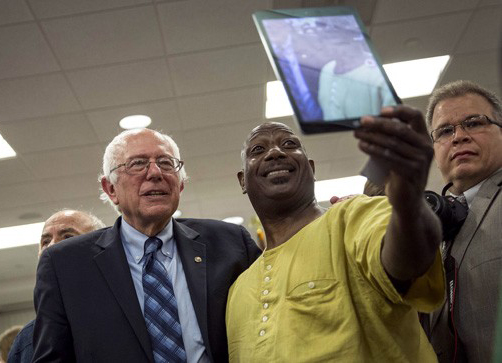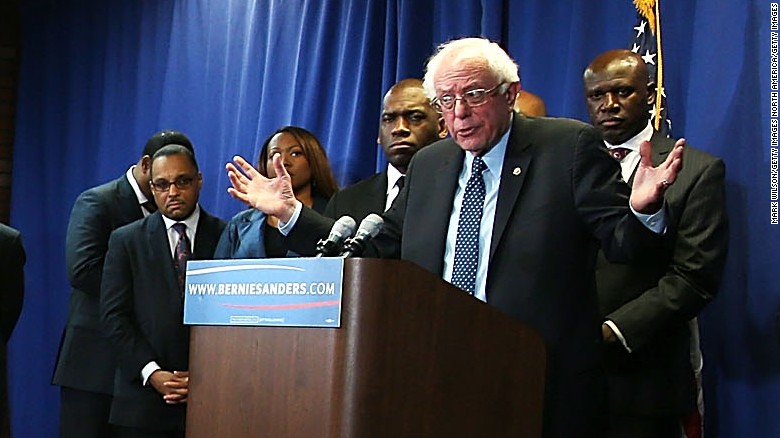Rock the (Black) Vote! – Part 2 of 3
Black folks don’t #FeelTheBern – But Why?
It’s that time again, y’all! Every four years, politicians jockeying to be the next president of the United States dust off their Black people black book and show us how much they care about the African-American community, while also trying to convince us that our issues are their issues. This year the democrats, Senator Bernie Sanders and Hillary Clinton are vying hard.
Join Parlé Magazine for a three part series where we’ll get behind the bluster to unearth the truth about the candidates’ records with the African-American community. In our second installment we focus on Senator Bernie Sanders, the self-described “Democratic Socialist” running for the Democratic nomination.
Why is Bernie Sanders, a lifelong progressive and friend of the Civil Rights movement, struggling to gain ground with the African-American community?
If you’re in Michigan and can’t find any TUMS or Imodium, it’s probably because Bernie Sanders gave Hillary Clinton’s campaign a serious case of heartburn following his surprise victory in the Michigan Democratic primary on Tuesday. Sanders edged out Clinton with 49.8 percent of the total vote. Despite Sanders’ win, Clinton still walked away with 65 percent of Michigan’s Black vote. But why is Sanders, a lifelong progressive and friend of the Civil Rights movement, struggling to gain ground with the African-American community?
The youngest child born to Polish immigrants in Brooklyn, New York, Sanders first became active in social justice when he was a student at the University of Chicago in the 1960s. There he joined the Congress of Racial Equality and the Student Nonviolent Coordinating Committee as a protest organizer. Both organizations played a critical role in the success of the Civil Rights movement of the 1960s. In 1962 he led a student protest of the university’s segregated housing policy and was quoted as saying, “”We feel it is an intolerable situation when Negro and white students of the university cannot live together in university-owned apartments.” This was the first Civil Rights sit-in in Chicago’s history.
In 1963 Bernie Sanders joined the Rev. Martin Luther King Jr. and other Civil Rights activists for the March on Washington for Jobs and Freedom where King would give his legendary “I Have a Dream” speech. Later that year Sanders was arrested during an anti-segregation protest back in Chicago. Long before John Crawford, Tamir Rice, and Sandra Bland became household names after dying as a result of police violence, Sanders actively protested against police brutality, even drawing the ire of local law enforcement.
Then there’s the infamous Violent Crime Control and Law Enforcement Act of 1994 (aka The 1994 Crime Bill, “3 Strikes”). This law, sponsored by then-president Bill Clinton and publicly supported by his wife (#SuperPredators), is credited for having a disproportionate adverse affect on Americans of color. While Bernie ultimately voted for the bill, he only did so to ensure protections for domestic violence victims, which were also part of the bill.
However, Sanders had insight into the long-term ramifications of the bill as a whole and warned his congressional colleagues of its unintended impact. Though his warnings went unheeded and the law led to mass incarceration of minorities on a massive scale, Sanders proved that he hadn’t forgotten his social justice roots. Even when a campaign event was taken over by #BlackLivesMatter activists, Sanders allowed protesters to have the floor and air their grievances against the justice system (and idiot cop wannabes in Florida).
With receipts like these, one would think that Sanders would have support with the Black community on lock. However that support is small among Black millennials and almost non-existent for older African-Americans. Even with outspoken advocates like Dr. Cornel West and rapper/activist Killer Mike, Sanders can’t seem to break Hillary Clinton’s death grip on the Black vote.
Rock the (Black) Vote! – Part 1 of 3 | Is Hillary Clinton a champion for Black Americans?
Part of the reason may be because Sanders and his positions are still largely unknown to Americans of all demographics. There’s been an uptick in name recognition for Sanders the past few months, but the Clinton brand has been around for decades. Sanders is like your favorite neighborhood café. It has amazing food and a friendly staff who know you on a first name basis. Clinton on the other hand is McDonalds, churning out cheap Big Macs soaked in preservatives and McRibs made out of this stuff. The food’s crap, but it’s cheap and there’s been one on every corner for your entire life.

Then there’s the fact that though Sanders has deep roots in civil rights and social justice, it appears that he has been largely absent from the fight for some time. Sanders never gave up on his fight for social and economic justice, but he hasn’t been as present in various protests and demonstrations for some time. Gone are the days of Sanders getting into the thick of protesting, which makes sense given that he is an elected official with a family and responsibilities to consider. However this absence from the front lines allowed Sanders, a vocal but largely unrecognizable Civil Rights figure, to fade into the background. The Clintons on the other hand are flashy and eager to hit a public relations gold mine at every cookout and Bonner Brothers Hair Show they can finagle their way into.
But there’s been another cost to Sanders recess from the front lines – He’s out of touch. During the CNN Democratic debate in Flint, MI, co-moderator Don Lemon asked the candidates what their “racial blind spots” were. Lemon sought to have the candidates dig deeper into how they felt their individual experiences and/or White privilege might have made it harder for them to recognize the injustices people of color face every day. While Clinton gave a well-thought out answer about her mother sending her out into the community to learn about the world around her, Sanders floundered.
“When you’re white you don’t know what it’s like to be living in a ghetto, you don’t know what it’s like to be poor, you don’t know what it’s like to be hassled when you walk down the street, or you get dragged out of a car. And I believe that as a nation in 2016 we must be firm in making it clear: We will end institutional racism and reform a broken criminal justice system.”
While some understood the points Bernie Sanders was trying to make, others felt as though the senator’s answer was demeaning. By making general statements about Blacks living in ghettos and Whites being middle to upper class, Sanders painted himself as a White savior out of touch with the strides that the Black community has made despite countless obstacles. Many viewers gave Sanders a collective side eye on social media.
So how does a 74-year-old, Jewish senator representing Vermont make inroads with the Black community? Sound off in the comments below and don’t forget to follow us on Facebook or @ParleMag on Twitter.

